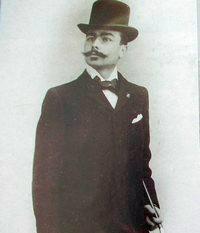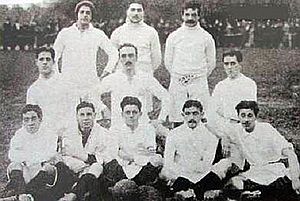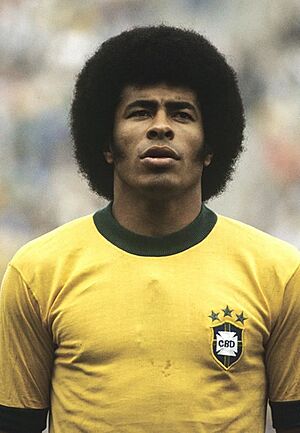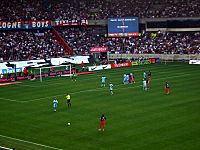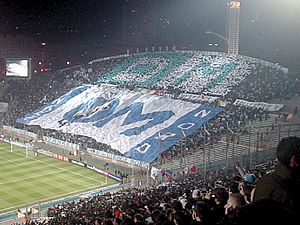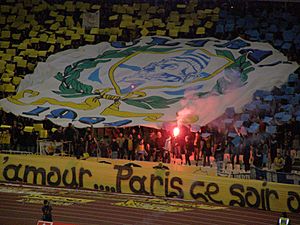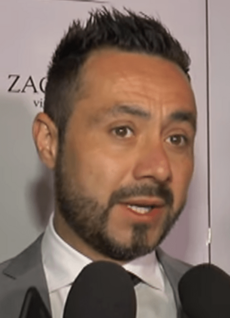Olympique de Marseille facts for kids
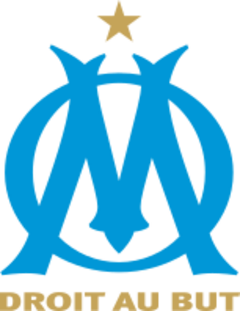 |
|||
| Full name | Olympique de Marseille | ||
|---|---|---|---|
| Nickname(s) | Les Phocéens (The Phocaeans) Les Olympiens (The Olympians) Les Minots (The Boys from Marseille) |
||
| Short name | Olympique Marseille Marseille OM |
||
| Founded | 31 August 1899 | ||
| Ground | Stade Vélodrome | ||
| Capacity | 67,394 | ||
| Owners | Frank McCourt (95%) Margarita Louis-Dreyfus (5%) |
||
| President | Pablo Longoria | ||
| Head coach | Roberto De Zerbi | ||
| League | Ligue 1 | ||
| 2021–22 | Ligue 1, 2nd of 20 | ||
|
|
|||
Olympique de Marseille, often called Marseille or OM, is a professional football club from Marseille, France. They play in Ligue 1, which is the top football league in France.
The club was started in 1899. OM has won many trophies in France, including 9 Ligue 1 titles, 10 Coupe de France cups, and 3 Coupe de la Ligue cups. They also won the UEFA Champions League once and the UEFA Intertoto Cup once. In 1993, Marseille became the first French club to win the UEFA Champions League. They beat Milan 1–0 in the final. In 2010, Marseille won their first Ligue 1 title in 18 years.
Marseille's home stadium is the Stade Vélodrome. It can hold 67,394 fans. They have played there since 1937. The stadium was updated between 2011 and 2014 for the UEFA Euro 2016 tournament. Marseille has a huge fan base and often has the highest attendance in French football. For example, in the 2018–19 season, their average home crowd was over 50,000 people. They have a big rivalry with Paris Saint-Germain, and their matches are called Le Classique.
In 2016, American businessman Frank McCourt bought 95% of the club. He appointed Pablo Longoria as the club president in 2021. Marseille is one of the richest football clubs in the world. In 2023, it was ranked 28th globally for its brand power.
Contents
Club History and Achievements
Olympique de Marseille was founded in 1892 by René Dufaure de Montmirail. The club was first known by other names like Sporting Club. In 1899, they chose the name Olympique de Marseille. This name honored the ancient Olympic Games and the city's founding by Greeks from Phocaea many centuries ago.
At first, rugby union was the club's main sport. The club's motto, Droit au but (meaning "Straight to the Goal"), comes from rugby. Football became popular at OM around 1902. Marseille quickly became a top team in the city. In 1904, they won their first local championship.
Early Successes and Professional Era
In the 1920s, Olympique de Marseille became a strong team in France. They won the Coupe de France in 1924, 1926, and 1927. In 1929, they won the French championship. The 1924 Coupe de France was their first major title. Many famous French players, like Jules Dewaquez and Jean Boyer, played for Marseille during this time.
In 1932, Marseille became a professional club. In 1937, they won their first professional French championship. They also won the Coupe de France in 1935 and 1938. During World War II, the team had amazing seasons. In 1942–43, they scored 100 goals in 30 matches. One player, Aznar, scored nine goals in a single game! In 1948, Marseille won the French championship again.
In 1952, the team almost got relegated, but Gunnar Andersson saved them. He was the top scorer with 31 goals. Andersson is still Olympique de Marseille's all-time top scorer with 194 goals. Marseille was relegated for the first time in 1959. They played in the second division until 1965.
The Leclerc Era and Challenges (1965–1986)
Marcel Leclerc became president in 1965. Under his leadership, Marseille returned to the top division. They won the Coupe de France in 1969. They also won the First Division in 1971, with Josip Skoblar scoring a record 44 goals. In 1972, they won both the Ligue 1 title and the Coupe de France.
However, Marcel Leclerc left the club in 1972. After this, Marseille went through a tough period. They only won one Coupe de France in 1976 and were relegated again. Young local players, known as the Minots, helped the team return to the First Division in 1984.
The Tapie Era and European Glory (1986–1996)
In 1986, Bernard Tapie became the new club president. He built a very strong team. He signed many famous players like Jean-Pierre Papin, Chris Waddle, Didier Deschamps, and Rudi Völler. Between 1989 and 1992, Olympique de Marseille won four league titles in a row. They also won the French Cup.
The biggest moment was winning the UEFA Champions League in 1993. Basile Boli scored the only goal against Milan in the final. This was the first time a French club won this important European trophy.
However, this success was followed by a difficult time. In 1994, the club faced problems with money and a match-fixing issue. They were sent down to the second division for two years. They also lost their 1992–93 league title.
Return to Success and Modern Era (1996–Present)
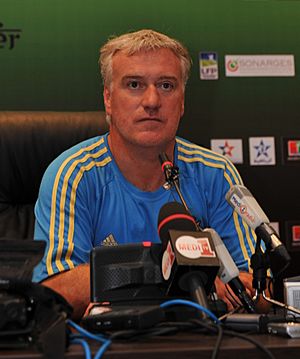
Marseille returned to the top league in 1996. They reached the UEFA Cup Final in 1999, but lost to Parma. In 2004, they reached the UEFA Cup Final again, beating strong teams like Liverpool. But they lost to Valencia. In 2005, Marseille won the UEFA Intertoto Cup.
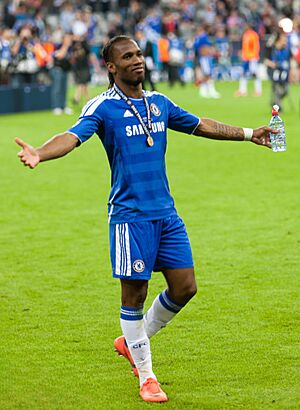
In 2007, Marseille lost the Coupe de France final on penalties. However, they qualified for the UEFA Champions League group stage. In the Champions League, they beat Liverpool 1–0 at Anfield, which was a big achievement.
Marseille finished second in Ligue 1 in 2009. In 2010, they won the Coupe de la Ligue for the first time in 17 years. Two months later, they won their first Ligue 1 championship in 18 years. They also won the Trophée des Champions in 2010 and 2011. In 2011, they reached the last 16 of the Champions League. They also set a Champions League record by winning 7–0 away against Žilina.
Recent Years and New Ownership
In 2012, Didier Deschamps left as coach. Elie Baup took over and led the club to a second-place finish in the 2012–13 season. However, in the 2013–14 Champions League, Marseille lost all six of their group games. This was a tough time for the club.
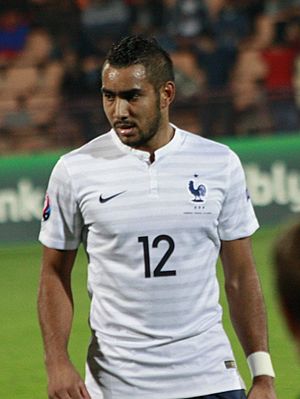
In 2014, Marcelo Bielsa became the manager. In his first season, the club was at the top of the league for seven months but finished fourth. After a year, Bielsa surprisingly resigned. In 2016, Marseille sold several key players.
On August 29, 2016, American businessman Frank McCourt bought the club. He appointed Jacques-Henri Eyraud as president and Rudi Garcia as manager. In 2018, Marseille reached the final of the 2017–18 UEFA Europa League, but lost to Atlético Madrid.
In the 2019–20 Ligue 1 season, Marseille finished second, qualifying for the 2020–21 UEFA Champions League. In February 2021, Andre Villas-Boas left as coach. Pablo Longoria became the new president.
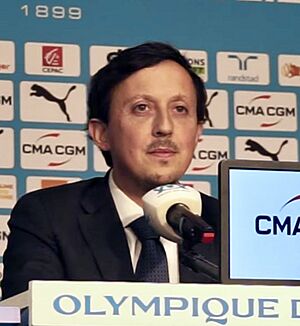
In 2022, Marseille finished second in Ligue 1 again, securing a spot in the Champions League for the 2022–23 season.
Le Classique: A Big Rivalry
Le Classique is the name for the football matches between Paris Saint-Germain (PSG) and Olympique de Marseille. It's like "El Clásico" between Barcelona and Real Madrid in Spain. This rivalry is about more than just football. It represents the capital city (Paris) against the south of France (Marseille).
The rivalry became very popular in the 1990s. Both clubs were very strong then. PSG and Marseille are the only French clubs to have won major European trophies. PSG won the UEFA Cup Winners' Cup in 1996, and Marseille won the UEFA Champions League in 1993. Even with ups and downs, these matches always have a special atmosphere.
Marseille's Home Stadium
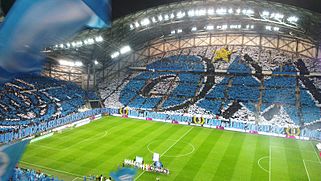
From 1904 to 1937, Marseille played at the Stade de l'Huveaune. This stadium was owned by the club and could hold 15,000 people. In 1937, OM moved to the much larger Stade Vélodrome.
The Vélodrome has been updated several times. It was renovated for the UEFA Euro 1984 and the 1998 World Cup. For the UEFA Euro 2016, a roof was added, and its capacity increased to 67,000.
Before each home game, the song "Jump" by Van Halen is played. When Marseille scores a goal, "Come with Me" by Puff Daddy is played.
Team Colors and Logo
Marseille's traditional kit colors were white shirts and shorts with blue socks. Since 1986, they have mostly worn all white, but in 2012–2013, they returned to blue socks. The blue and white colors come from the city flag of Marseille.
The club's first logo had the letters "D" and "M" intertwined. The motto, "Droit au but" (meaning "Straight to the Goal"), was also part of it. This motto came from the club's rugby days. The logo changed over the years. In 1993, a star was added to the logo to celebrate winning the UEFA Champions League. The current logo, revealed in 2004, features a simple "O" and "M" in turquoise, with the golden star and the motto below.
Supporters
The amazing atmosphere at the Stade Vélodrome is created by OM's passionate supporters. They sit in the "Curva" sections behind both goals.
North Curve (Virage Nord)
The North Curve is home to several fan groups like Marseille Trop Puissant, Fanatics, and Dodger's. In 2002, this section was named after Patrice de Peretti, a founder of the Marseille Trop Puissant group. The club's third kit in 2010 honored this group with red, yellow, and green colors.
South Curve (Virage Sud)
The South Curve is named after Nicolas Roze, a noble who helped Marseille during a plague in 1720. This section is controlled by groups like Commando Ultra '84, which was the first "ultra" fan group in France. The South Winners are also here, and their colors are orange.
Marseille fans also have strong friendships with fans from other clubs, like AEK Athens, Livorno, and FC St. Pauli. They often show support for these teams with banners.
Current Players
First-team squad
|
|
Marseille B and Youth Sector
|
|
Out on loan
|
Club Officials
- Last updated: 12 August 2024
- Source:
Club Honours and Awards
Marseille has won many titles. They have won the French national championship nine times. Only Paris Saint-Germain (thirteen titles) and Saint-Étienne (ten titles) have won more. Marseille also has the second-best record in the Coupe de France, with ten titles. They won both the championship and the cup in 1972 and 1989. They are also the first French club to win the UEFA Champions League, which they did in 1993.
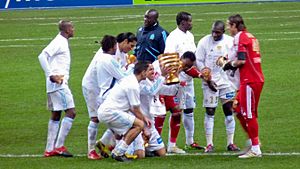
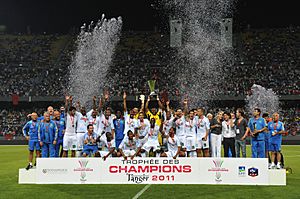
| Type | Competitions | Titles | Seasons |
|---|---|---|---|
| Domestic | Ligue 1 | 9 |
1936–37, 1947–48, 1970–71, 1971–72, 1988–89, 1989–90, 1990–91, 1991–92, 2009–10 |
| Ligue 2 | 1 |
1994–95 |
|
| Coupe de France | 10 |
1923–24, 1925–26, 1926–27, 1934–35, 1937–38, 1942–43, 1968–69, 1971–72, 1975–76, 1988–89 |
|
| Coupe de la Ligue | 3 |
2009–10, 2010–11, 2011–12 |
|
| Trophée des Champions | 3 |
1971, 2010, 2011 |
|
| Coupe Charles Drago | 1 | 1957 | |
| Continental | European Cup / UEFA Champions League | 1 |
1992–93 |
| UEFA Intertoto Cup | 1 | 2005 |
Individual Player Awards
- Ballon d'Or: Jean-Pierre Papin won this award in 1991 while playing for Marseille.
- European Golden Shoe: Josip Skoblar won this award in 1971 for scoring 44 goals.
- UNFP Player of the Year: Didier Drogba won this award in 2004.
- UNFP Young Player of the Year:
* Franck Ribéry – 2006 * Samir Nasri – 2007 * William Saliba – 2022
See also
 In Spanish: Olympique de Marsella para niños
In Spanish: Olympique de Marsella para niños
 | Bayard Rustin |
 | Jeannette Carter |
 | Jeremiah A. Brown |


